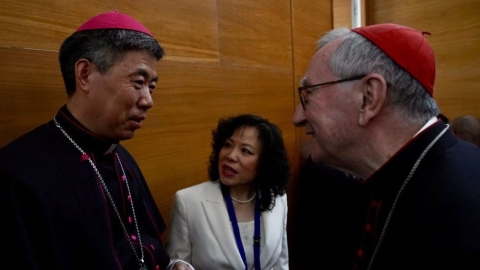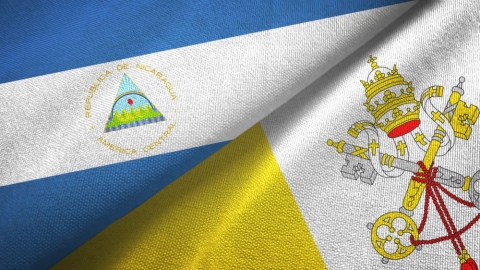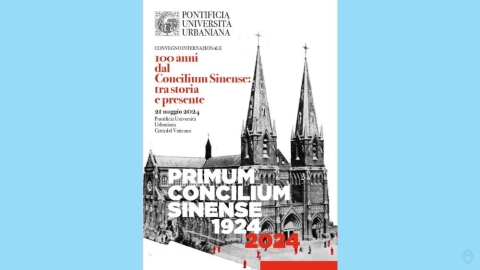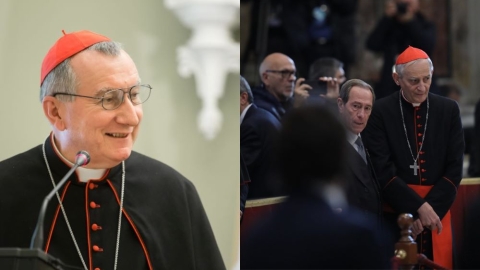Philippines: Deadly Bomb Attack During Mass

The gymnasium of Mindanao State University, located in Marawi, devastated by the attack.
The start of Advent in the Philippines was marked by an attack in the city of Marawi which has caused at least four deaths and wounded about fifty, perpetrated during the Mass of the First Sunday of Advent on December 3, 2023, celebrated in the gymnasium of Mindanao State University.
The start of Advent in the Philippines was marked by an attack in the city of Marawi which has caused at least four deaths and wounded about fifty, perpetrated during the Mass of the First Sunday of Advent on December 3, 2023, celebrated in the gymnasium of Mindanao State University.
Marawi is the capital of the province of Lanao del Sur, a part of Bangsamoro, which is the name for the Muslim autonomous region established in 2019 following agreements aiming to end the war with the Muslim militias of Mindanao. It is the large island of the southern Philippines.
In 2017, the region was the scene of five months of war after an Islamist group took control and proclaimed an Islamic State (IS). The local Christian community had been directly targeted: the vicar general and numerous parishioners of the Mary Help of Christians Cathedral (Maria Auxiliadora) had been taken hostage and liberated after four months.
Related Article:
An Attack in Retaliation?
The attack occurred after an airstrike by the Philippine army on December 1, which killed 11 militants of the Dawlah Islamiya-Philippe organization in Mindanao. The Chief of Staff of the Armed Forces of the Philippines, General Romeo Brawner, stated that it was perhaps an attack carried out in retaliation to this military operation.
“It’s a possibility we are studying,” stated Brawner. “Based on the evidence we have gathered, a strong percentage points to the Maute Islamic State.” It is likely that the explosion was caused by a grenade or a handmade bomb.
In a statement, President Ferdinand Marcos of the Philippines strongly condemned these “senseless and particularly heinous attacks perpetrated by foreign terrorists.” The University of Mindanao also condemned this “act of violence,” declaring its “solidarity” with its Christian community and the victims of “this tragedy.”
The Reaction of the Philippine Episcopate
Bishop Pablo Virgilio David, Bishop of Kalookan and president of the Catholic Bishops’ Conference of the Philippines (CBCP) in a statement highlighted the fact that the attack coincided with the First Sunday of Advent. The perpetrators of the attack, stated the bishop, “chose this occasion to detonate a bomb.”
Recalling that last Wednesday, in many countries of the world, Catholics celebrated “Red Wednesday,” a day of remembrance for persecuted Christians, Bishop David added that these faithful killed during Mass in Marawi “shed their blood as a libation of the blood of Christ. They professed their Faith during the last Mass they attended.”
Cardinal Orlando Quevedo commented: “This massacre, perpetrated on the First Sunday of Advent, is the most terrible crime committed against innocent faithful on a holy Christian day. It is a tragic recreation of the attack perpetrated on the Jolo Cathedral.” The Jolo Cathedral attack occurred on January 29, 2019, and caused 20 deaths and wounded dozens.
Related Article:
Small Bands of Insurgents
Lanao del Sur and Maguindanao del Sur form part of the Bangsamoro Autonomous Region in Muslim Mindanao (BARMM). The attacks of militants against buses, Catholic churches, and public markets are characteristic of the unrest that has shaken the region for decades.
In 2014, Manila signed a peace agreement with the largest rebel group in the country, the Moro National Liberation Front, thus ending their bloody armed insurrection. But small bands of Muslim insurgents opposed to the peace agreement remain, including militants with allegiance to the Islamic State. Communist rebels also operate within the region.
(Sources : Asianews/actu.fr/Wikipedia – FSSPX.Actualités)
Illustration : Facebook / Provincial Government of Lanao Del Sur





